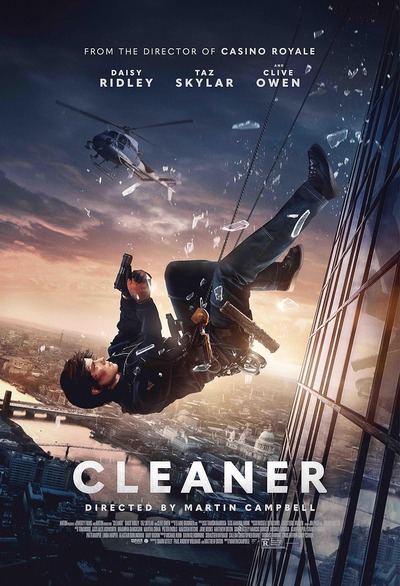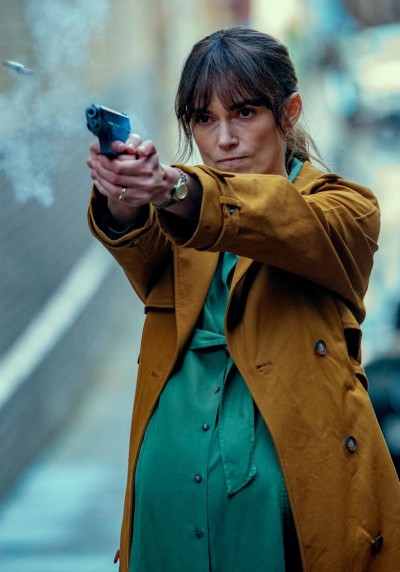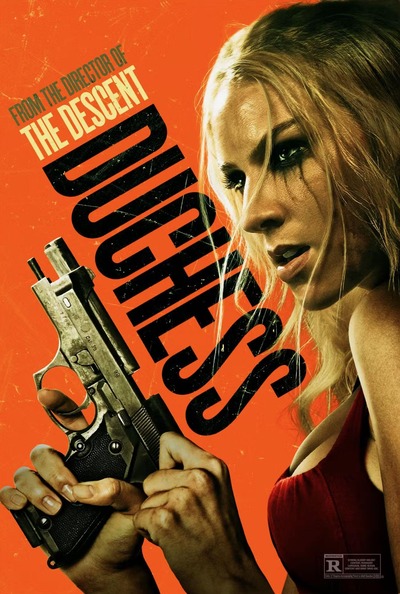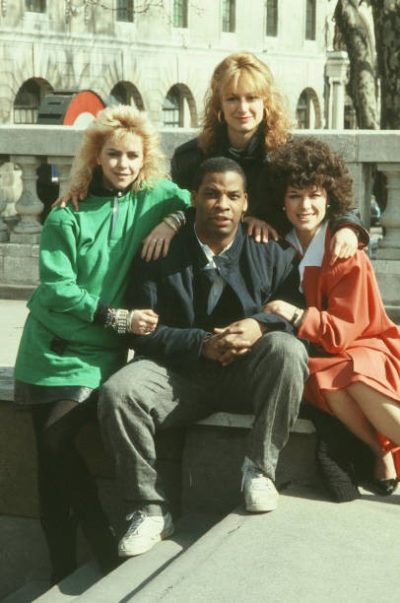★★★
“Too much soap, rather than opera.”
 Having very much enjoyed the Our Girl movie, I was interested in checking out the TV series version, which ran for four seasons from 2013 through 2020. You’ll notice, however, that only two are being covered here. Part of the reason for that is logistical: only seasons 1-2 are available on any of our current streaming services. That wouldn’t necessarily be an absolute show-stopper. But there were also reasons why we – mostly Chris – opted to draw a line under the second season. Each series tells the story of a different nurse in the British army. The first is about teenager Molly Dawes (Turner), who joins to escape a dead-end life in East London. The second follows established soldier Georgie Lane (Keegan).
Having very much enjoyed the Our Girl movie, I was interested in checking out the TV series version, which ran for four seasons from 2013 through 2020. You’ll notice, however, that only two are being covered here. Part of the reason for that is logistical: only seasons 1-2 are available on any of our current streaming services. That wouldn’t necessarily be an absolute show-stopper. But there were also reasons why we – mostly Chris – opted to draw a line under the second season. Each series tells the story of a different nurse in the British army. The first is about teenager Molly Dawes (Turner), who joins to escape a dead-end life in East London. The second follows established soldier Georgie Lane (Keegan).
The first is considerably more successful, with a better character arc for the lead – it’s basically an extended remake of the film, with all its strengths, including a fine performance from Turner. It goes further into her career, going through her first tour in Afghanistan, where Molly’s relationship with a local girl opens a whole can of worms. There is some soap opera stuff, in a love triangle between her, commanding officer Captain Charles James (Aldridge) and fellow soldier Dylan Smith (Iwan Rheon), but it’s not overpowering. The action side of things is well-handled – South Africa stands in for the Middle East – with the tension of patrols in a hostile environment, where even a child is a potential threat, being particularly apparent.
In the second season, however, the balance tips. Lane has a mission in Ethiopia, where she draws the ire of British jihadist Abu Jasser (Michael James), which continues to imperil her after she returns to Britain. While this strand, as well as the kidnapping and rescue of Georgie which precedes it, is fine, there’s another love-triangle, and this one is much more annoying. Georgie was previously stood up at the altar by a comrade, Elvis Harte (Pasqualino), and is now engaged to Dr. Jamie Cole (Royce Pierreson). However, while in Ethiopia, Harte shows up and begins to work his way back into her affections. It’s this element which caused Chris to lose both sympathy for and interest in the lead character, and eventually, the show.
I can see where’s she’s coming from, because it’s hard to empathize with a heroine whose sense of loyalty appears to be so weak. I get that this angle was injected to add dramatic tension. But Georgie’s eventual, not unreasonable, realization that she’s not the marrying kind, didn’t require her to (and I quote) “slut around.” On the heels of a not dissimilar situation in season 1, the implication is that women in the armed forces will inevitably end up getting romantically involved with their fellow soldiers, which I suspect is not the intended message. Discovering the two further seasons continue to follow Georgie, rather than a new character, was enough to get us to pull the plug prematurely, and move on.
Creator: Tony Grounds
Star: Lacey Turner, Michelle Keegan, Ben Aldridge, Luke Pasqualino





 Fair play to Woollard and his team for making a feature movie with no resources to speak of. The problem is, watching this, it’s painfully obvious that they had no resources to speak of. Two space-suits and a fog machine are not enough for a film, especially in a genre like science-fiction, which tends to rely on spectacle. Oh, smaller scale works can still be remarkably successful: the night before this, I watched glorious and highly recommended time-travel film Beyond the Infinite Two Minutes. But if you’re not going to offer epic scale, you need to have something else to repay the audience. An hour and three-quarters of watching characters stumbling about in the gloom is not it.
Fair play to Woollard and his team for making a feature movie with no resources to speak of. The problem is, watching this, it’s painfully obvious that they had no resources to speak of. Two space-suits and a fog machine are not enough for a film, especially in a genre like science-fiction, which tends to rely on spectacle. Oh, smaller scale works can still be remarkably successful: the night before this, I watched glorious and highly recommended time-travel film Beyond the Infinite Two Minutes. But if you’re not going to offer epic scale, you need to have something else to repay the audience. An hour and three-quarters of watching characters stumbling about in the gloom is not it. Director Campbell recently appeared here with the entertaining
Director Campbell recently appeared here with the entertaining  Going off the Wikipedia article about Rose Dugdale, I can’t help feeling this could have been more epic than it was. I mean, a former debutante who, “As an IRA member, took part in the theft of paintings worth IR£8 million, a bomb attack on a Royal Ulster Constabulary station using a hijacked helicopter, and developed a rocket launcher” which used – I kid you not – packets of biscuits to absorb the recoil. There’s so much there, it feels a shame the movie focuses almost entirely on the art theft. This was carried out in 1974, raiding a stately home in rural Ireland (fun fact: the house was used as a location in
Going off the Wikipedia article about Rose Dugdale, I can’t help feeling this could have been more epic than it was. I mean, a former debutante who, “As an IRA member, took part in the theft of paintings worth IR£8 million, a bomb attack on a Royal Ulster Constabulary station using a hijacked helicopter, and developed a rocket launcher” which used – I kid you not – packets of biscuits to absorb the recoil. There’s so much there, it feels a shame the movie focuses almost entirely on the art theft. This was carried out in 1974, raiding a stately home in rural Ireland (fun fact: the house was used as a location in  This was my favourite new television show of 2024, and might have been my pick overall. It’s a very strong mix of action and drama, with a fabulous cast of characters. I think I might have to go back to the first season of
This was my favourite new television show of 2024, and might have been my pick overall. It’s a very strong mix of action and drama, with a fabulous cast of characters. I think I might have to go back to the first season of  Reed calls in her top assassin, Sam (Whishaw), to protect Helen, fearing she might also be targeted. He has a history with Helen, dating back to before the birth of her children with Wallace. Things spiral out of control, involving the suspicious death of the Chinese ambassador, his missing daughter, a previous hit Sam botched, and Helen’s relentless pursuit of revenge, while trying to keep her family life intact. It’s a lot of balls to keep in the air, but the script does a fine job of avoiding confusion, with the wrap-up proving particularly admirable in its clarity. While I’ve read complaints about it being implausible, I have definitely seen worse. There’s room for both this, and more grounded spy shows like Slow Horses.
Reed calls in her top assassin, Sam (Whishaw), to protect Helen, fearing she might also be targeted. He has a history with Helen, dating back to before the birth of her children with Wallace. Things spiral out of control, involving the suspicious death of the Chinese ambassador, his missing daughter, a previous hit Sam botched, and Helen’s relentless pursuit of revenge, while trying to keep her family life intact. It’s a lot of balls to keep in the air, but the script does a fine job of avoiding confusion, with the wrap-up proving particularly admirable in its clarity. While I’ve read complaints about it being implausible, I have definitely seen worse. There’s room for both this, and more grounded spy shows like Slow Horses. Marshall has been involved in our genre back to 1998, when he wrote
Marshall has been involved in our genre back to 1998, when he wrote  This feels almost like a throwback to the silent era, and ‘white slave’ films with titles like Traffic in Souls, combined with a significant fear of ‘the other’. As such, it’s both painfully simplistic, and endlessly fascinating in the layers of interpretation which can be read into it, should you be so inclined. On the most basic level, it’s your everyday tale of “good” girls, kidnapped for sale to the highest bidder, who need to fight to retain their modesty and virtue. [Though let the record show, at no point is there any bikini-wearing wielding of automatic weapons, despite what the poster clearly wants you to think. The heroines here prefer weapons of the blunt and/or pointy variety]
This feels almost like a throwback to the silent era, and ‘white slave’ films with titles like Traffic in Souls, combined with a significant fear of ‘the other’. As such, it’s both painfully simplistic, and endlessly fascinating in the layers of interpretation which can be read into it, should you be so inclined. On the most basic level, it’s your everyday tale of “good” girls, kidnapped for sale to the highest bidder, who need to fight to retain their modesty and virtue. [Though let the record show, at no point is there any bikini-wearing wielding of automatic weapons, despite what the poster clearly wants you to think. The heroines here prefer weapons of the blunt and/or pointy variety] This is the story of Syrian sisters Yusra Mardini and her sister Sarah, played by real-life sisters Nathalie and Manal Issa. Growing up, they were trained by their father, a professional swimmer himself, and had the goal of reaching the Olympics for their country. The (still ongoing) Syrian Civil War led to the sisters leaving their homeland, and this is mostly the story of their journey, through Turkey, across the Mediterranean in a
This is the story of Syrian sisters Yusra Mardini and her sister Sarah, played by real-life sisters Nathalie and Manal Issa. Growing up, they were trained by their father, a professional swimmer himself, and had the goal of reaching the Olympics for their country. The (still ongoing) Syrian Civil War led to the sisters leaving their homeland, and this is mostly the story of their journey, through Turkey, across the Mediterranean in a 
 The latest take on one of Britain’s greatest historical heroines has come in for a fair bit of critical flak. But I really did not think it was all that bad. Sure, it plays fast and loose with historical accuracy (Christianity wasn’t a thing in Britain at the time). However, we’re dealing with someone about whom there is very little reliable record. Why not throw in chunks of the Arthurian mythos, if it might make for a more interesting end product? The usual basics are there. Queen of the Iceni Boudica (Kurylenko) loses her husband (Standen), and subsequently falls foul of the occupying Roman Empire. She raises an army, leads a rebellion, kicks Roman butt for a while, but eventually goes down, fighting. That’s the Cliff Notes version.
The latest take on one of Britain’s greatest historical heroines has come in for a fair bit of critical flak. But I really did not think it was all that bad. Sure, it plays fast and loose with historical accuracy (Christianity wasn’t a thing in Britain at the time). However, we’re dealing with someone about whom there is very little reliable record. Why not throw in chunks of the Arthurian mythos, if it might make for a more interesting end product? The usual basics are there. Queen of the Iceni Boudica (Kurylenko) loses her husband (Standen), and subsequently falls foul of the occupying Roman Empire. She raises an army, leads a rebellion, kicks Roman butt for a while, but eventually goes down, fighting. That’s the Cliff Notes version.